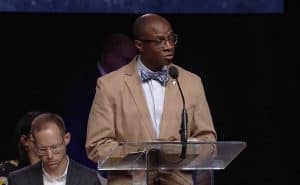I’m Tom Ascol, pastor of Grace Baptist Church in Cape Coral, Florida.
I want to express appreciation to Dr. Woods and his committee for what they’ve done, but for the sake of our witness I want to add strength to this resolution—make it clearer and more explicitly theological by offering what I hope will be taken as a friendly amendment.
So after the first “whereas,” I would like to offer, “WHEREAS, Critical race theory and intersectionality are godless ideologies that are indebted to radical feminism and postmodernism and neo-Marxism,
and then add two “resolveds” after the first “resolved”:
“RESOLVED, that we remind Southern Baptists that critical race theory and intersectionality emerge from a secular worldview that are rooted in ideologies that are incompatible with Christianity; and be it further
“RESOLVED that we repudiate all forms of identity politics and any ideology that establishes human identity in anything other than the divine creation in the image of God and for all redeemed humanity, our common identity, together eternally united to Christ.”
[Go here to see what the resolution would have said had the amendments Tom Ascol offered had been accepted.]
J. D. Greear: Is there a second to that amendment?
Seconds vocalized.
Greear: Alright, you may speak to it.
Ascol: I just think it’s important that we understand the origins of these two ideologies. They do come from godless Marxism, and we also ought to recognize the way that they are commonly used today—not by any members of our committee that have set forth this very carefully worded resolution, but we need to be aware of how the ideologies are being used in our culture, and there are attempts to assert these ideologies in the false way of seeing the world into evangelical life and churches. And so if we make it clear about their origins and reemphasize that we have our identity in Christ and Christ alone, I just think it strengthens this resolution. I hope it will be received as a friendly amendment.

Dr. Curtis Woods, chairman of the Resolutions Committee, responds.
I appreciate the words and the sentiment of the messenger. We will take this as an unfriendly amendment for this purpose. It is our aspiration in this resolution simply to say that critical race theory and intersectionality are simply ana-ly-tic-al tools and are to be used as tools, not as a worldview.
And we would also say that in light of the time we don’t have an opportunity to talk about the origins as well as the implications of critical race theory.
When you begin to think about worldviews and philosophical constructs—the apostle Paul appealed to the Epicurean sensualists. He appealed to the rationalists on Mars Hill. But that did not mean that Paul imbibed the views of the rationalists or the sensualists. When the apostle Paul quotes from Epimenides in Titus 1:12, it did not mean that Paul believed that Epimenides’s worldview was consistent [with Christianity].
What we are saying is that this can be utilized simply as an analytical tool, not a transcendent worldview above the authority of Scripture. And we stand by the strength of this resolution.
The audio portion of the entire debate on Resolution 9 is available here.
